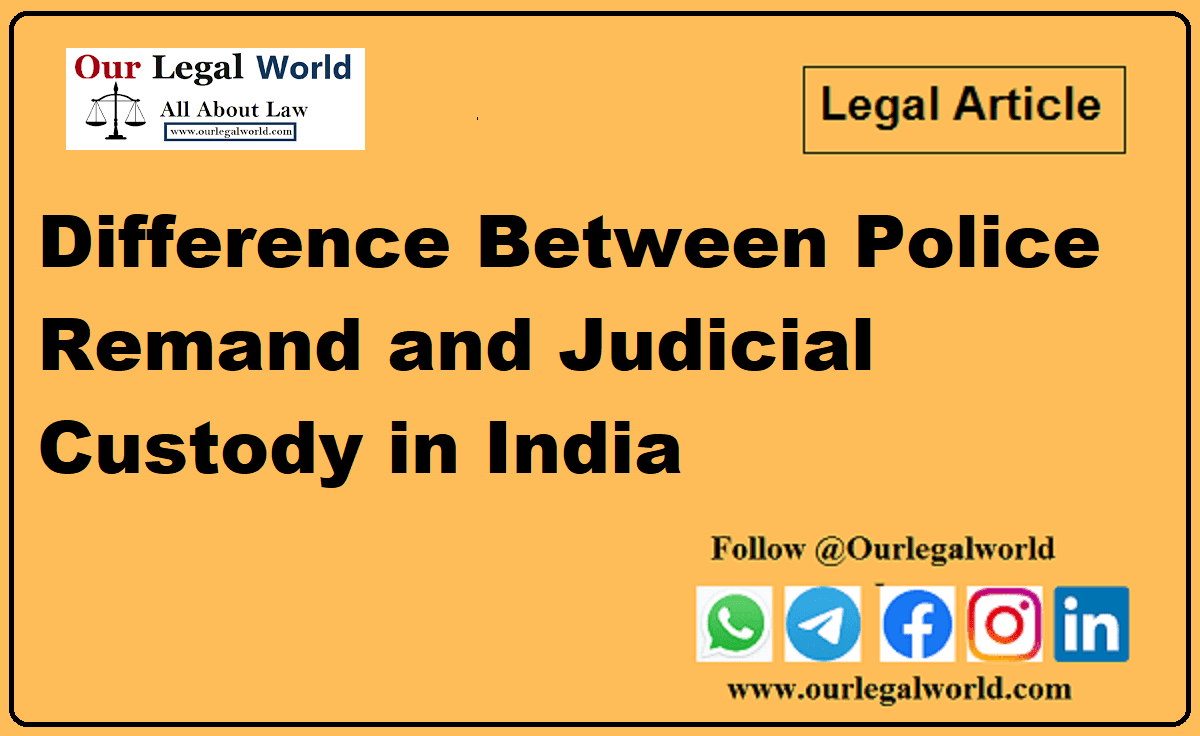Difference Between Police Remand and Judicial Custody in India
Meaning of Custody?
The term “custody” refers to apprehending someone to provide protective care.
The words “custody” and “arrest” are not synonymous. It is true that in every arrest there is custody but vice versa is not true. The mere utterance of words or gestures or flickering of eyes does not amount to arrest. Actual seizure or touch of a person’s body with a view to arresting is necessary.
In India, both police remand and judicial custody are legal terms related to the detention of individuals who are under investigation or facing criminal charges. These terms refer to different stages of the legal process and involve different authorities and procedures. Here’s an explanation of the differences between police remand and judicial custody in India:
Police Remand:
- Police remand refers to the period during which a person who has been arrested is held in the custody of the police for the purpose of interrogation and further investigation.
- The maximum duration of police remand is generally limited to 15 days in total, with each remand period not exceeding 7 days. However, this duration can vary depending on the specific laws and the seriousness of the case.
- Police remand is granted by a Magistrate based on a request made by the investigating officer (police) when they believe that the accused’s custody is necessary for the progress of the investigation.
- During police remand, the accused is primarily in the custody of the police, and the police have the authority to question and interrogate the accused to gather evidence and information related to the case.
- The accused has the right to legal representation during police remand, and the police are required to follow legal procedures, including informing the accused of their rights.
Judicial Custody:
- Judicial custody, on the other hand, is the period during which a person who has been arrested is placed in the custody of the judicial authorities, typically a Magistrate or a Judge.
- It is the stage that follows police custody, and it occurs when the police no longer require the physical custody of the accused for interrogation or investigation purposes.
- Judicial custody can be extended for a longer duration, sometimes until the trial of the case is completed or until bail is granted.
- The accused is produced before a Magistrate who decides whether to send the accused to judicial custody or grant bail. The Magistrate ensures that the accused’s rights are protected during this process.
- While in judicial custody, the accused is usually lodged in a jail or a correctional facility, and their rights and conditions of confinement are subject to judicial oversight.
Difference Between Judicial Custody and Police Custody
| Basis of Difference | Police Custody | Judicial Custody |
| Control | Police officer in charge of the police station | Magistrate |
| Investigation | Conducted by the police | Relies on evidence produced in court |
| Procedure | Based on arrest, FIR or suspicion | Must be produced before a magistrate within 24 hours, granted bail if charges not proved |
| Period of Detention | Maximum 15 days | 90 days for non-bailable offences with severe punishment, 60 days for bailable offences |
| End of Custody | Court permission is required for interrogation | Kept in judicial custody until granted bail |
| Jail | Kept in prison or police station cell | Kept in central jail |
| Interrogation | Police officers can interrogate | Court permission required for interrogation |
In Central Bureau of Investigation, Special Investigation Cell-I, New Delhi v. Anupam J.Kulkarni (AIR 1992 SC 1768) the question regarding arrest & detention in custody was dealt with it was held that the Magistrate under S.167(2) can authorise the detention of the accused in such custody as he thinks fit but it should not exceed fifteen days in the whole. Therefore the custody initially should not exceed fifteen days in the whole. The custody can be police custody or judicial custody as the magistrate thinks fit.
Can police interrogate in judicial custody?
Cr.P.C. S.167 – Criminal Procedure – Judicial custody –Interrogation by Police – Permissible – Magistrate can direct the place and manner – Mere interrogation by Police, during such custody by permission of the Magistrate, cannot change the nature of custody (Para 4) Gian Singh Vs. State (Delhi Administration) 1981 CRI.L.J. 100.
Also Read: Withdrawal From Prosecution Under Section 321 CrPc- OurLegalWorld
In summary, the main difference between police remand and judicial custody lies in who has custody of the accused and for what purpose. Police remand involves the police holding the accused for investigation purposes, while judicial custody involves the accused being held by the judicial authorities, usually after the investigation stage is complete or when the police no longer require physical custody. Both police remand and judicial custody are subject to legal safeguards and oversight to protect the rights of the accused.





![Tax Law Internship at Legum Attorney [Chamber of Ashish Panday], Delhi : Apply by 15th May 2025](https://www.ourlegalworld.com/wp-content/uploads/2025/05/IMG_0113-min.png)

